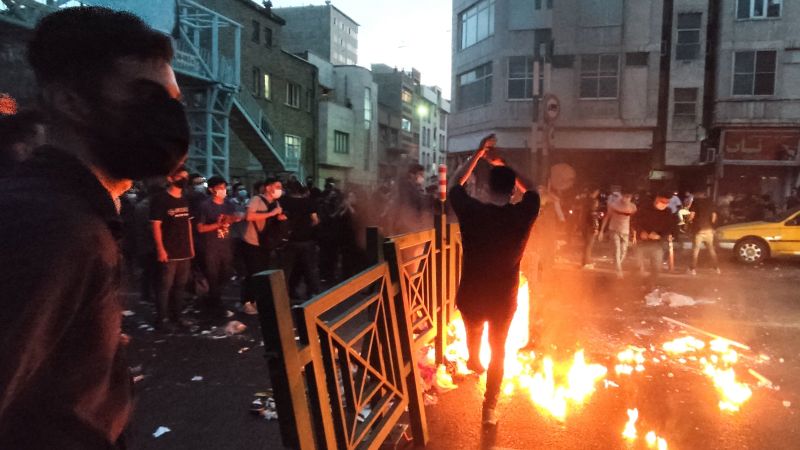Editor’s Note: A version of this story first appeared in CNN’s Meanwhile in the Middle East newsletter, a three-times-a-week look inside the region’s biggest stories. Sign up here.
CNN
—
An Iranian official’s comment signaling that the country’s notorious morality police had been shut down has raised more questions than answers.
Hasty clarifications by state media that sought to rebut the official’s comment quickly followed, along with pushback on social media by activists denying the so-called victory and even denouncing it as a “PR stunt” by the Iranian regime to silence protesters.
Experts warned about embracing pledges of either the abolition of the morality police or of the hijab law it seeks to enforce, noting that often regimes will make empty promises to citizens in desperate bids to quell unrest.
During a religious conference on Saturday in the city of Qom, Attorney General Mohammad Jafar Montazeri said that the Iranian morality police was being “abolished,” a comment that was quickly picked up by international media outlets, some of which hailed the “announcement” as a victory for Iranians who have been protesting against the government for months.
Montazeri’s comment came in response to a reporter who asked if the country’s morality police – or “guidance patrol” – were being disbanded. The attorney general was quoted by an Iranian state media outlet as saying: “Morality police have nothing to do with the judiciary. It was abolished from the same place it was launched.”
It is possible the comment was misinterpreted, and the tone from state media quickly changed.
On Sunday, state media was keen to downplay Montazeri’s comments, saying that the morality police does not fall under the authority of the judiciary.
Arab-language Al-Alam state television claimed foreign media were depicting Montazeri’s comments as “a retreat on the part of the Islamic Republic from its stance on hijab and religious morality as a result of the protests”, but that all that could be understood from his comments was that the morality police were not directly related to the judiciary.
“No official of the Islamic Republic of Iran has said that the Guidance Patrol has been shut,” Al-Alam said Sunday afternoon.
The decision to dismantle the morality police technically lies with the Supreme Council of Cultural Revolution, a body established in the early 1980s by Iran’s first Supreme Leader Ruhollah Khomeini, and which is today headed by President Ebrahim Raisi.
CNN has reached out to Iran’s Interior Ministry and the Supreme Council of Cultural Revolution for comment.
Montazeri’s comments about the morality police came just two days after the pro-reform outlet Entekhab reported him saying that Iran’s parliament and judiciary were reviewing the country’s mandatory hijab law, which has been in place since 1983.
A law enforcement body with access to power, arms and detention centers, the morality police are a major point of grievance for Iranians. Notorious for terrorizing citizens as they enforce the country’s conservative rules, the morality police have been the main coercive tool implementing Iran’s hijab law.
The morality police were cast into the international spotlight in September, when 22-year-old Mahsa Amini died three days after being arrested by the force and taken to a “re-education” center. The group is sanctioned by the United States and the European Union.
Since protesters took to the streets, however, witnesses say that the morality police had virtually disappeared from the streets of Tehran, greatly diminishing the state’s ability to regulate women’s dress codes.
“We see a lot of images, photos, videos of women in public places walking around without the hijab much more than what we had seen before September of this year,” Iranian-American journalist and political analyst Negar Mortazavi told CNN on Monday.
As Iranian security forces scramble to shut down protests, enforcing hijab may have no longer been a priority, says Sadjadpour.
“That’s not because their ideology has changed,” he told CNN, “but because their repressive bandwidth is limited.”
The morality police’s absence from the streets also raised questions about their relevance. While their abolition would indeed count as a win for protesters, experts say, there are other, deeper grievances driving protesters to the streets.
“When dictatorships know they’re in trouble they begin promising their citizens they will change who they are,” wrote Karim Sadjadpour, a senior fellow at the Carnegie Endowment for International Peace in Washington DC.
“These empty promises tend to embolden, rather than quell, popular demands for fundamental change,” he wrote on Twitter. “The Iranian regime appears to be entering this stage of its life cycle.”
Omid Memarian, a US-based Iran analyst, said the morality police had “already become irrelevant” in the wake of the ongoing protests. “When people chant across the country, ‘the Islamic Republic should go,’ such moves seem desperate. The regime is incapable of addressing the real grievances,” he wrote on Twitter.
Others worry that the Iranian regime may simply “rebrand” the morality police, in an effort to distance itself from its ominous name whilst maintaining tight control over mandatory hijab.
“In a way it has been interpreted as a play on words because essentially he is saying that there is no morality police, or guidance patrol,” said Mortazavi. “It has in some way been replaced or rebranded as the police of public safety.”
Mortazavi continued to say that the morality police have become “so notorious” that no official is “willing to take responsibility for it” and it is unclear “how sustainable it is going to be long term.”
“It goes back to how this enforcement of this law that is still on paper going to be stopped or changed,” she said. “Or is it going to come back after a different brand or a different name or different methods.”

